Bosch Dishwasher Leaking: 11 Reasons And How To Fix Them
Water leaks, malfunctions, and unclean dishes are the worst foes of dishwasher users!
But fear not, this post covers all sorts of Bosch dishwasher leaks, from common to rare.
Your Bosch Dishwasher could be leaking because of blockages or cracks in the tub, hoses, or drainage system. Sometimes, a broken water inlet valve can also be the cause. You can easily fix the problem by cleaning or replacing the affected parts.
Don’t worry though, I’ll help you patch these parts right up and even help you understand why these parts have issues in the first place!
Without further ado, let’s get started!
Why Is My Bosch Dishwasher Leaking
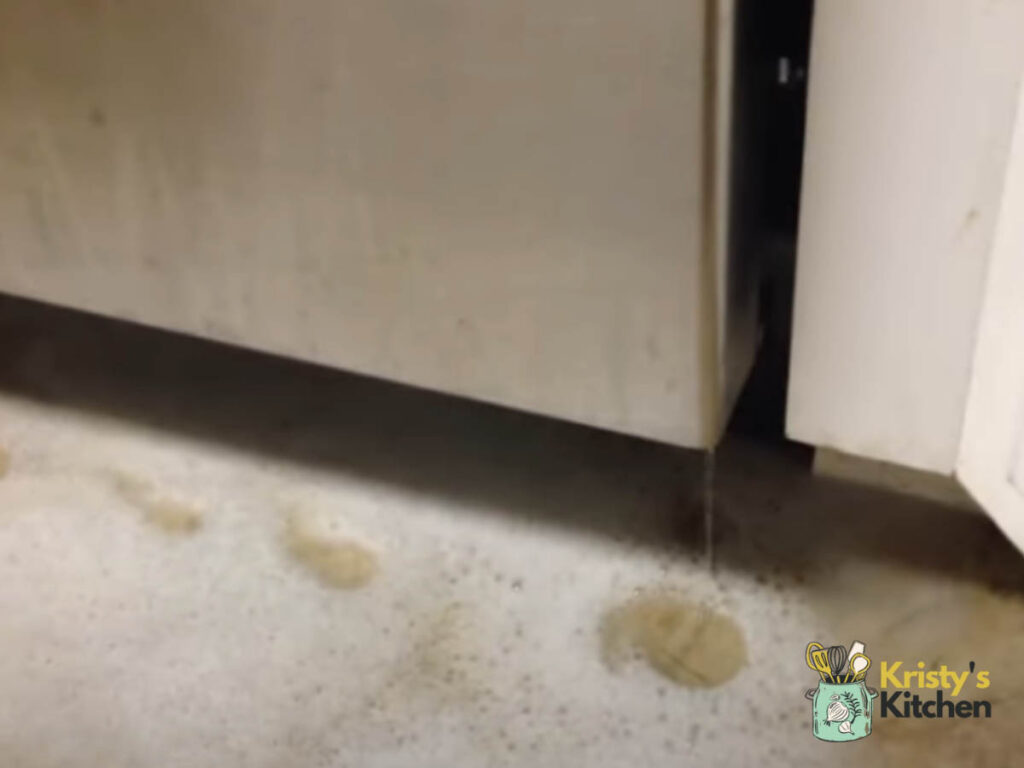
If you’ve noticed water pooling around your Bosch dishwasher, several reasons could be causing the leaks. Let’s delve into each of them.
Improper Detergent Use
You know how you put that special dishwasher detergent in the little compartment?
Well, using too much or the wrong type of detergent can make the dishwasher all foamy, and that foam can lead to leaks.
Broken Water Inlet Valve
Inside your dishwasher, there’s a little valve that’s supposed to let water in when it’s needed.
But sometimes, that valve can get worn out or broken, and when that happens, it may not close properly.
As a result, water sneaks out when the dishwasher is not even running.
Dishwasher Door Issue
Is your Bosch dishwasher leaking from bottom or top part of the door or from the handle?
That rubbery thing lining the edge of your dishwasher door – the door seal- is likely the cause. It’s supposed to keep water from escaping during the wash.
But, sometimes it can get damaged or not sit right, and that’s when water starts to find its way out.
The door latch itself can also be a cause. If it’s not working right, the door won’t close properly either, leading to even more water leaking out around the handle.
Something Up With The Drain Pump

If the drain pump or its housing has problems, it might not be able to properly drain out the water from your dishwasher.
As a result, it might pool up and leak out eventually.
These problems are caused due to damage from debris, wear and tear, electrical faults, foreign objects getting stuck inside, or simply aging and heavy use.
A Leaking Hose
Remember the hoses your dishwasher has for making water get in and out?
If those hoses get cracked or have loose connections, the water’s gonna find a way to escape.
Dishwasher Spray Arm
The spray arm inside your dishwasher spins around, spritzing water to clean those dishes.
But, it can get clogged or knocked out of place. And when that happens, water may start spraying where it’s not supposed to, causing leaks.
Issue With Dishwasher Sump
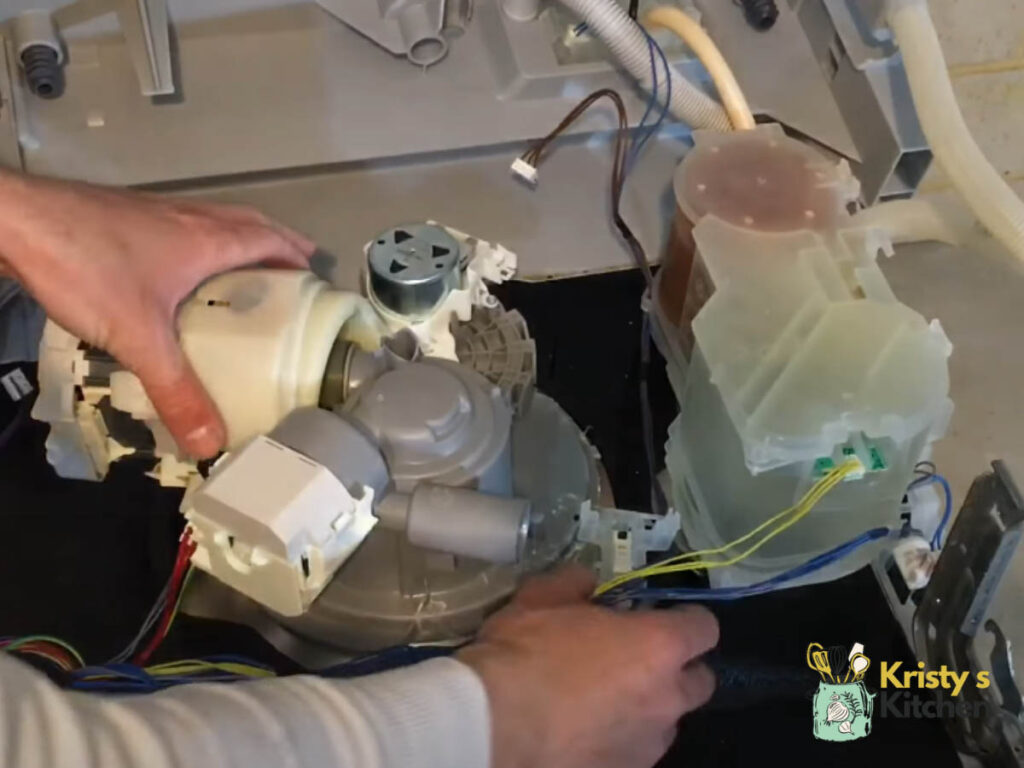
The sump is like the heart of your dishwasher, and if it’s clogged or has some issues, water can’t circulate properly, leading to leaks.
Clogged Drainage
If your dishwasher doesn’t drain properly, it can cause water to pile up and eventually leak out.
One common reason for this is when bits of food, dirt, or greasy stuff get stuck in the drain filter or drainage hose.
These things can build up over time and block the water from going out, so it ends up spilling out of the dishwasher.
Additionally, you’ll also start getting the Bosch Dishwasher Leak E15 error, as the water gathers in the base.
Leaky Dishwasher Tub
The dishwasher tub is like a big bowl that holds the water when you wash your dishes.
As time goes by, it can get little cracks or damage from using it a lot or accidentally dropping heavy things inside. Using strong cleaning stuff can also make it weaker.
Misaligned Washer
If your dishwasher isn’t leveled or properly aligned with the floor, it can cause water to pool in one area, leading to leakage.
Overfilling
If your dishwasher is filling up with too much water, it can overflow and cause leaks.
This could happen due to a faulty water level float or a problem with the dishwasher’s control board.
How To Fix Leaking Bosch Dishwasher
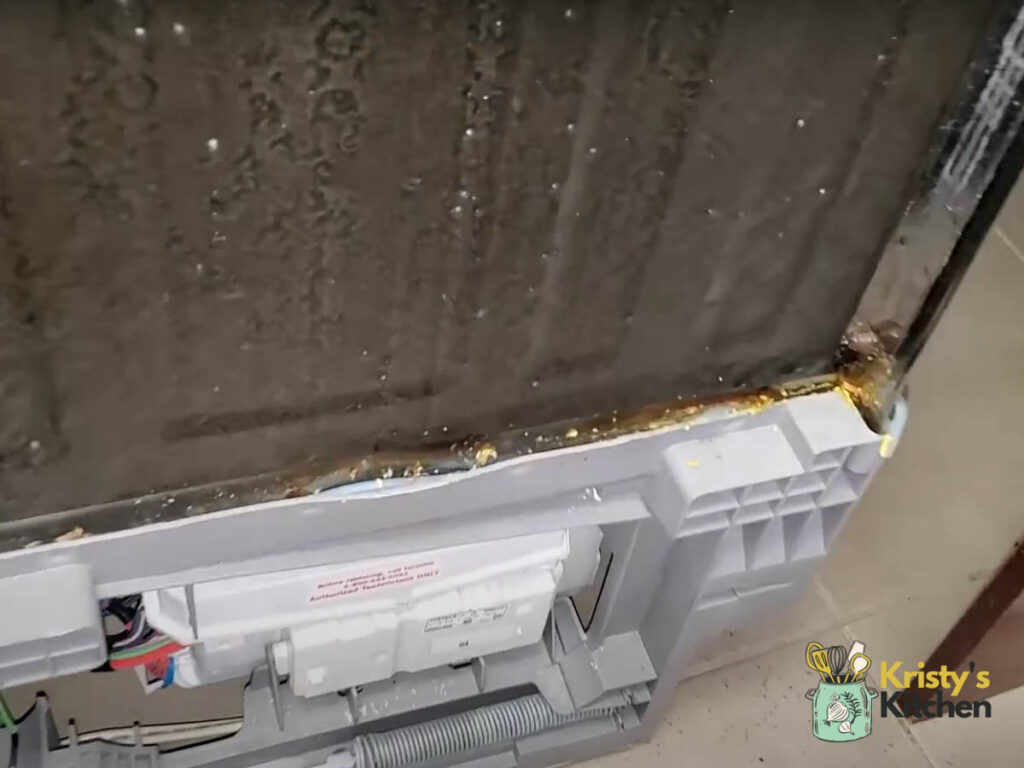
Now we can roll up our sleeves and fix it step by step. Let’s move on to that and get your dishwasher leak-free in no time!
1. Fixing Detergent Issues
If your Bosch dishwasher is leaking due to too much foam from the detergent, there’s not much you can do other than give your washer a thorough cleaning in case the suds slipped into the wrong places.
Just use the right detergent and follow the instructions on the pack next time.
2. Repairing or Replacing Water Inlet Valve
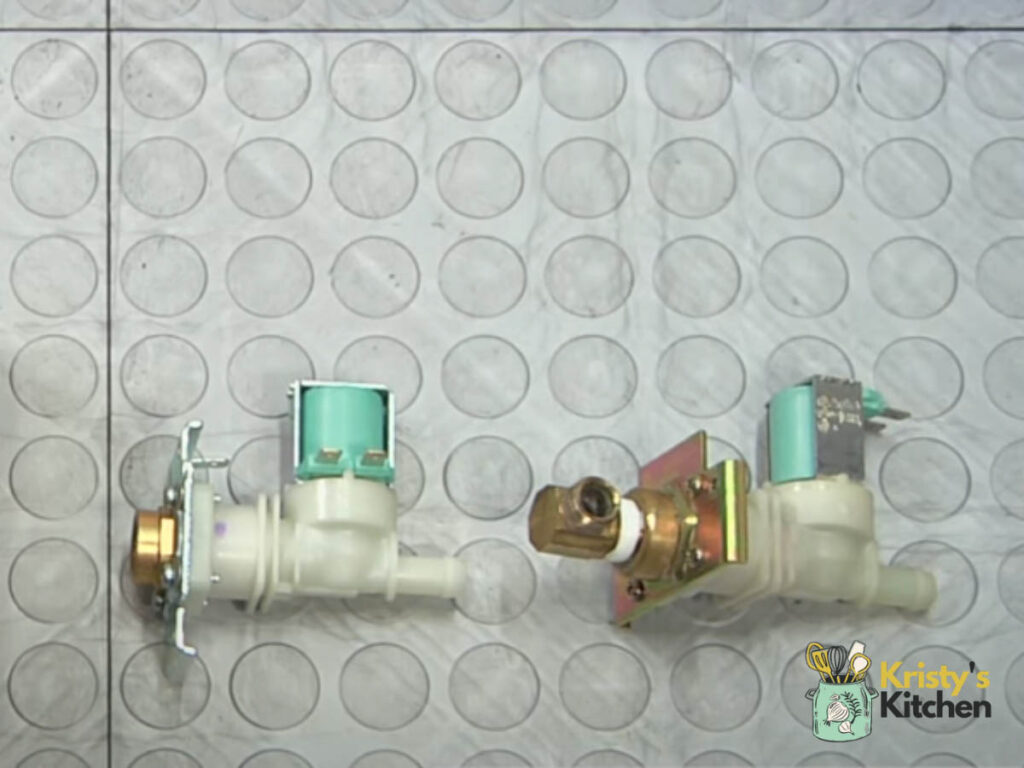
Is your Bosch dishwasher leaking from the water inlet valve? Here’s what you can do:
- Turn off the dishwasher and water supply.
- Find the water inlet valve at the bottom front.
- Disconnect water hose and electrical connections.
- Replace the old valve with a new compatible one.
- Reconnect water hose and electrical connections.
- Turn on water supply and power.
- Check for leaks.
3. Addressing Door Latch And Seal
Follow these steps to make sure it isn’t so easy for the water to slip out of your washer:
- Check if the dishwasher door closes securely. If not, inspect the latch for bending or looseness.
- Use a screwdriver to properly put the latch back in place if it’s loose.
- Examine the door seal or gasket for tears or improper seating.
- If there are issues, replace the door seal to ensure a watertight closure.
- Close the dishwasher door and run a test cycle to check if the leak is fixed.
4. Handling Clogged Drainage
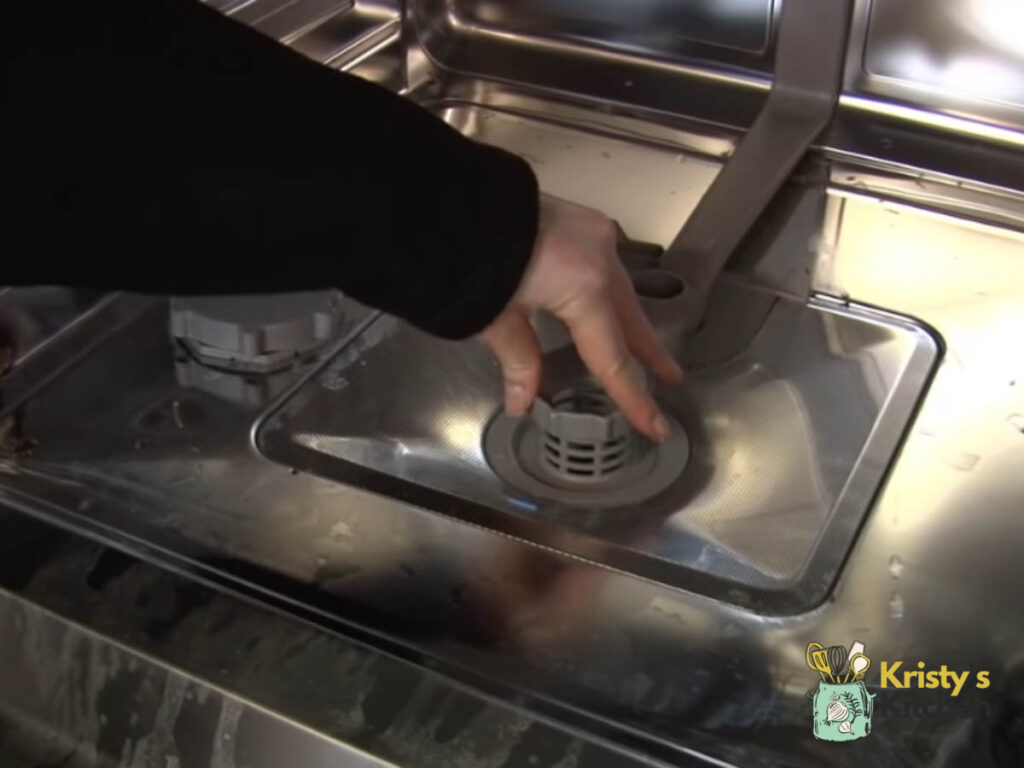
Spot your Bosch dishwasher leaking into base? This could be the perfect fix. Here’s how to take care of clogs in your drainage:
- Check the dishwasher’s drain filter for clogs.
- Clean the drain filter by rinsing under water and using a soft brush.
- Remove visible debris from the sump area..
- Reassemble the drain filter and hose.
- Run an empty test cycle to ensure proper drainage and no leaks.
5. Fixing Dishwasher Hose Leak
If something’s up with your hose, do the following:
- Power down the dishwasher and turn off the water supply.
- Inspect all hoses for cracks, holes, or loose connections.
- Tighten any loose ends.
- Straighten and unclog the drain hose with a pipe cleaner or brush
- Replace damaged hoses with new ones that fit your Bosch model.
- Turn on the water supply and dishwasher power to check if the leak is fixed.
6. Fixing Dishwasher Spray Arm Issues
This might sound slightly daunting, but it’s just as easy as clearing the drainage system:
- Remove the bottom rack to access the spray arm.
- Check the spray arm’s nozzles for clogs caused by food particles or debris.
- Clean the spray arm with warm, soapy water.
- Reinstall the spray arm and ensure it spins freely.
- Run a test cycle to check for any water leakage.
7. Addressing Drain Pump or Pump Housing Leaks
To fix a leak occurring from this, try the following:
- Turn off the dishwasher and water supply.
- Inspect the drain pump and housing for leaks or damage.
- If you spot any, time for a replacement – get one compatible for your Bosch model.
- Reinstall the pump with the help of your user manual.
- Reconnect wires and hoses to the new pump or housing.
- Turn everything back on and run a test cycle.
8. Handling Dishwasher Sump Problems
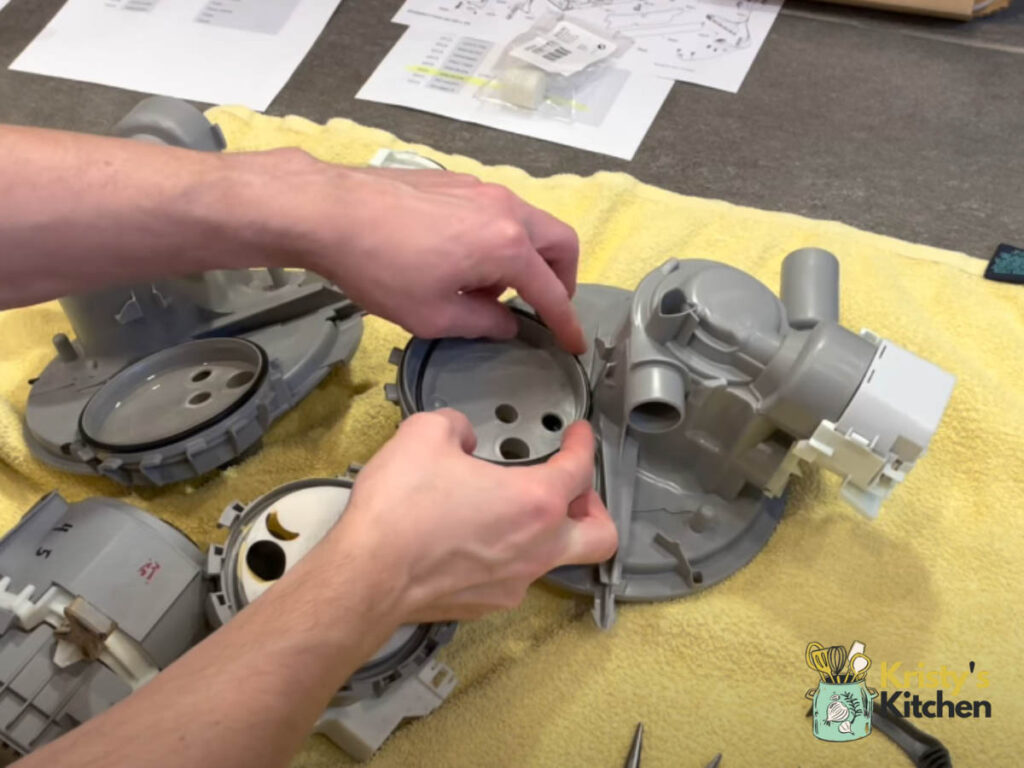
There’s no need for extra steps for this one – just inspect your sump. It’s a smaller, enclosed area at the bottom of the dishwasher’s interior, beneath the main tub.
If you notice something off, follow the same cleaning process as the one you used for drainage.
9. Dealing with Leaky Dishwasher Tub
If you find that the dishwasher tub is causing the leak, follow these steps:
- Turn off the power and water supply.
- Remove the bottom access panel.
- Inspect the tub for cracks or damage.
- Repair small cracks with dishwasher-safe sealant or replace the tub if needed.
- Take note of and disconnect components (hoses, spray arms, etc.).
- Install the new tub and reconnect the components.
- Reassemble the dishwasher and secure the access panel.
- Restore power and water supply, then perform tests.
10. Adjusting Misaligned Dishwasher
To realign your dishwasher, do this:
- Turn off the dishwasher and empty it.
- Use a bubble level to check if it’s leveled properly.
- Adjust the dishwasher’s height using the adjustable feet until it’s level.
- Lock the feet in position to secure the alignment.
- Test the dishwasher with a cycle to ensure no leaks due to misalignment.
11. Resolving Overfilling
If your dishwasher is overfilling even when you load it carefully, here’s what to do:
- Turn off the dishwasher and remove any water inside the tub.
- Check the water level float for smooth movement and clean it if needed.
- Inspect the control board for damage related to water filling.
- If necessary, replace the control board.
- Run a test cycle and monitor for overfilling and leaks.
Expert Safety Tips For Fixing Leaky Bosch Dishwashers:
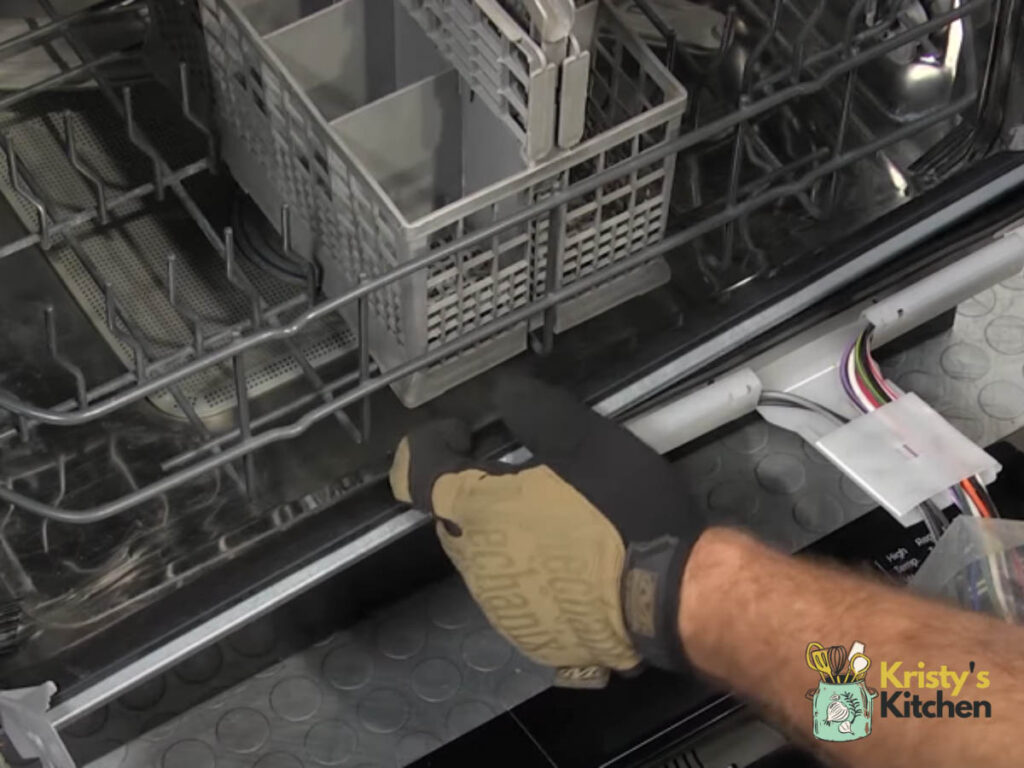
When fixing a leaky Bosch dishwasher, safety is essential. Follow these easy safety tips:
- Turn Off Power and Water: Before starting, turn off the dishwasher’s power and water supply to stay safe.
- Wear Gloves and Eye Protection: Protect your hands and eyes with gloves and safety glasses.
- Use the Right Tools: Use the correct tools for the job to avoid accidents.
- Be Gentle When Unplugging Parts: Take your time when removing parts, so you don’t break anything.
- Don’t Over-Tighten: Tighten screws and connections just enough; don’t make them too tight.
- Read the Manual: Check the dishwasher’s manual for safety advice and repair tips. It might even have special instructions meant for your exact dishwasher model.
- Double-Check After Repair: Make sure everything is back together correctly to prevent leaks.
Remember, your safety comes first. If you’re not sure about a repair, ask for help.
How To Prevent Bosch Dishwasher From Leaking
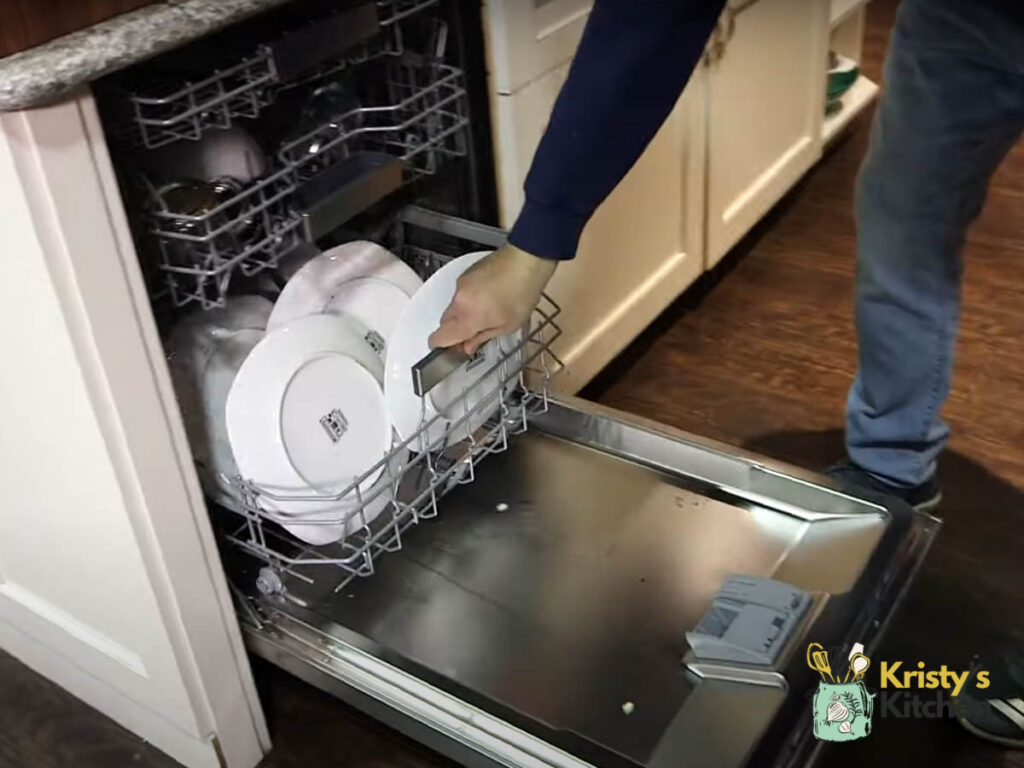
As you can see, there are plenty of reasons for leaks. Who’d want to deal with all that hassle right?
Well, you can prevent your washer from leaking with these tips:
- Don’t Overload The Dishwasher: Avoid cramming too many dishes into the dishwasher. When it’s too full, water might not circulate properly, leading to leaks.
- Ensure It’s Aligned: Always remember to check if your dishwasher is sitting level on the floor. It can tilt sometimes, causing water to gather in one spot and leak out.
- Use the Right Dishwasher Soap: Only use a detergent made for dishwashers. Other soaps might create too many bubbles and cause leaks. Never use regular dish soap.
- Tighten Hose Connections Every Now and Then: Check all the hoses for tightness. Loose connections can lead to water spilling out during use.
- Use Gentle Cleaners: Be gentle when cleaning the dishwasher. Avoid harsh cleaners that could cause damage and leaks.
- Watch Out For Food Chunks: Keep large food chunks out of the dishwasher, as they can cause clogs and leaks. Before loading your dishes, try giving them a quick rinse in the sink.
- Don’t Open the Door Mid-Cycle: Try not to open the dishwasher door while it’s running. It could spill water and cause leaks.
- Keep the Inside Clean: Regularly wipe down the inside of the dishwasher to prevent residue buildup and potential leaks.
- Get Regular Maintenance Checks: Consider having a professional check your dishwasher regularly to catch any issues and keep it in good working condition.
FAQs
How much does it cost to fix a leaky dishwasher?
The cost varies based on the issue – leaks can happen due to faults with plenty of parts. Contact a repair service for an estimate.
Do Bosch dishwashers have leak detection?
Yes, many Bosch dishwashers have leak detection systems, including older models.
How does Bosch dishwasher leak protection work?
Bosch dishwashers use sensors and a drip pan to detect leaks. If water is detected, the dishwasher shuts off to prevent more leaks. It also flashes an error code – usually the E08 code.
Final Thoughts
You’re all set to protect your kitchen from filthy floods! But if you encounter a leak you can’t fix, you’re among the rare few.
You might have to reach out to customer service.
Don’t worry, though. This post should be more than enough— you have the holy grail of dishwasher leak guides here.
Grab your safety gear and cleaning supplies, and get started. Your dishwasher will be free from leaks in a jiffy!
